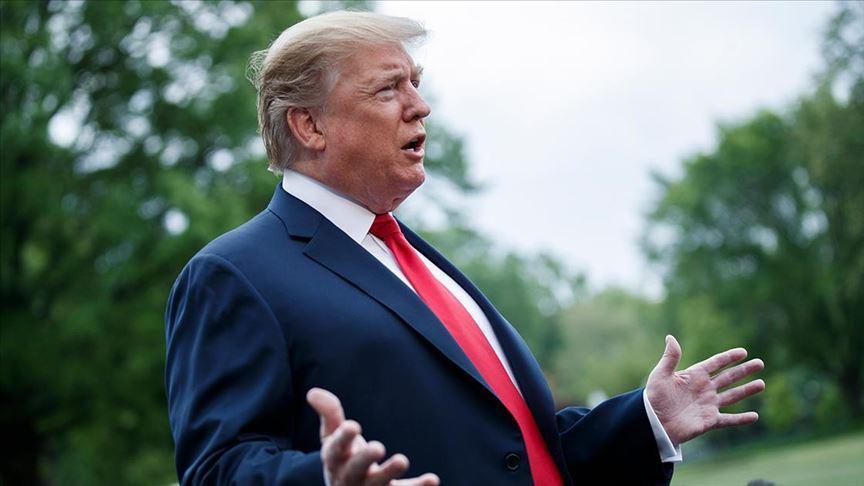
U.S. President Donald Trump said on Oct. 7 he was not "siding with anybody" on Syria after his decision to pull back troops.
"I am not siding with anybody. We've been in Syria for many years. Syria was supposed to be a short-term hit. We were supposed to be in and out," Trump said during a press conference at the White House, adding he has "a good relationship" with his Turkish counterpart Recep Tayyip Erdoğan.
Trump has been facing mounting pressure in Washington after the White House announced late Sunday that the U.S. would pull back its forces in Syria ahead of a "long-planned" Turkish operation.
The Trump administration has ruled out any U.S. support for the operation, and in the face of significant pushback, the president vowed "if Turkey does anything that I, in my great and unmatched wisdom, consider to be off limits, I will totally destroy and obliterate the economy of Turkey."
In his remarks, the U.S. president said there were just 50 troops in the area where Ankara was planning to carry out the operation and did not want them to get hurt.
"I think there is a lot of pressure on Turkey. They have been fighting with the PKK for many years," said Trump, adding the former Obama administration started the dispute and "natural war" between Turkey and the PKK, citing reports.
A senior administration official speaking to reporters denied suggestions that Trump acted on the request of anyone, emphasizing the president's priority has been the protection of U.S. forces.
The official further said the U.S. will not engage with Turkey militarily, noting Washington "is not in a position to, and will not be in a position to, fight Turkey over any actions that it takes with respect to Syria."
"There's no green light. We're protecting our troops, and the president's made it very clear, that there should be no untoward actions with respect to the Kurds or anyone else," he said.
Meanwhile, Senator Lindsey Graham, a stalwart Trump ally, lashed out against the decision on Oct. 7 during a Fox News interview he followed up with a flurry of Twitter posts. Graham, who has previously recognized the "legitimate national security threat to Turkey" in northeastern Syria, threatened Ankara with economic sanctions that he expects would be supported by a veto-proof majority in Congress.
Graham said after speaking with Senator Chris Van Hollen, the most senior Democrat on the Senate Budget Committee, the lawmakers would introduce legislation to slap economic penalties on Turkey "if they invade Syria and will call for their suspension from NATO if they attack Kurdish forces who assisted the U.S. in the destruction of the ISIS Caliphate."
While Trump could theoretically veto such bipartisan legislation, Graham said he expects it to have the support of at least two-thirds of lawmakers that would enable lawmakers to override the president should be try to stymy the legislation.
Graham and Van Hollen are among droves of lawmakers, including top Democratic presidential contenders, who have come out against the Trump administration's planned draw down in Syria.
Senate Majority Leader Mitch McConnell, the chamber's top Republican, added his name to those in opposition, saying in a rare public split with the president that "major new conflict between Turkey and our partners in Syria would seriously risk damaging Turkey’s ties to the United States and causing greater isolation for Turkey."
"I urge the President to exercise American leadership to keep together our multinational coalition to defeat ISIS and prevent significant conflict between our NATO ally Turkey and our local Syrian counterterrorism partners," he said in a statement.
Trump went on the defensive earlier on Oct. 7, retweeting half a dozen Twitter posts defending his announcement.
"We aligned under Obama not with 'the Kurds,' but with the PKK, the sworn enemy of the Turkish Republic, our ally. We were sowing the seeds of a Turkish-PKK war with that policy. We were also driving Turkey toward Russia," Mike Doran, a senior fellow at the Hudson Institute think-tank in Washington, wrote in one such message.
He was referring to former President Barack Obama.
Kurt Schlichter, a conservative columnist, said that as Turkey nears its operation. "The President is keeping us out of it."
"The gang that never met a war they didn’t want to fight (and fail to win) will be outraged. When they howl, ask them one thing. Ask them exactly how many American lives it’s worth," he wrote. "I say 'Zero.'”
Turkey has long called for the U.S. to partner with it in the fight against ISIL, a terror group Ankara has worked to root out, arresting and deporting its members within Turkey.
Since 2016, Turkey’s Euphrates Shield and Olive Branch operations in northwestern Syria have liberated the region from YPG/PKK and ISIL terrorists, making it possible for nearly 400,000 Syrians who fled the violence to return home to Western Syria.
In its more than 30-year terror campaign against Turkey, the PKK -- listed as a terrorist organization by Turkey, the U.S. and the EU -- has been responsible for the deaths 40,000 people, including women, children and infants. The YPG is the Syrian branch of the terrorist organization PKK.